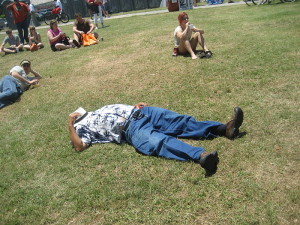David Porter » Articles at Suite 101 » Masterful Inactivity – the Solution Everybody Runs Round in Circles to Find
Masterful Inactivity – the Solution Everybody Runs Round in Circles to Find
Inactivity, masterful inactivity – time for a return to the concept? Published in 2013 on Suite 101, this is republished to complete the transfer across of material from that site. It is out of date with some details, but not the main thrust.
Less is more should perhaps become the mantra as governments run round like headless chickens trying to do something in a crisis.
Whenever anything goes wrong in the country, as it invariably does many times a week, it isn’t long before somebody somewhere starts the cry that SOMETHING MUST BE DONE!!
MPs, under pressure from constituents fed by 24/7 news, start clamouring for something, anything. We may then get an inquiry chaired by some bigwig, a task force, a major relaunch/revamp/rethink, a public consultation, a Government Tsar, a White Paper or a whole new law.
Unintended Consequences of Laws
Within the living memory of people over 30, we’ve had gun ownership restrictions which have not stopped criminals. Laws designed to curb defined dog breeds after some children were badly mauled led to the dogs becoming weapons of choice for many career criminals. Court-imposed Anti-Social Behaviour Orders (ASBOs) became badges of honour.
The Football Spectators Act (1989) was the consequence of the need to do something in the face of crowd violence and the Hillsborough Stadium tragedy. It was never fully thought through. Alleged salmonella in eggs led to 2 million chickens being slaughtered, a gift to European importers.
Mad cow disease and foot and mouth disease in the UK followed similar patterns of mass slaughter because something had to be seen being done. We are not alone in Britain – world flu pandemics from overseas – whatever it is, people worry. Dutiful Members of Commons and Lords on their feet demanding this or that piece of hobby-horse legislation makes for good headlines.
That is not to say that unintended consequences were allowed to create chaos or malicious perverse effects. In the main, new laws/actions/initiatives are from the best of motives. But still they have the same often negative effects that nobody saw coming. Or if they did see them in advance, nobody listened or took them seriously.
Making Things Worse
In 2010 I wrote on Suite 101 that good intentions in law-making are not only insufficient, but actually may make the situation worse. The unintended, unforeseen consequences of new laws is a given nowadays when bills are pushed through without full and rigorous scrutiny and somebody actually thinking: what does this do to that or to them?
I quoted the Abraham Lincoln definition of democracy as government of the people, by the people, for the people. I said that people expect laws to right wrongs. When they dont, the further solution is often more laws. Think of the ongoing Euro debate: when something from/in Europe is seen not to be working, some people advocate more Europe as the answer.
Writing in The Daily Telegraphy of 19 Feb 2013, former Chairman of the Conservative research Department, George Bridges, argued that in the face of clamour to regulate, control, restrict, change, sometimes the art of doing nothing in a purposeful way, demands a comeback.
Doing Nothing, But With Purpose
This is masterful inactivity, not burying heads in sand. Bridges dismissed the objections of those who think doing nothing is dithering, laziness, lack of courage or absence of vision.
He urged politicos to stick to their guns, not be deterred by those demanding immediate action and, in effect, stay calm and carry on. To solve problems quietly, in possession of the full facts, trusting the people, not the state reflects a sense that government works best when focussed on a few big things, not peppering the world with more initiatives and schemes.
Public Expectations
Ministers keep a few measures in their pockets, just in case there is a sudden crisis/need for a sparkling new idea or the PM needs a new pointer for a major speech. That’s how the system works. Occasionally, some half-baked schemes are leaked prematurely to choruses of disapproval, but people should be glad our elected governments are constantly working on solutions to our problems.
As an MP I used to sit in my surgeries in various venues around the constituency on Saturday mornings, and take on every kind of problem, crisis and cause, because it was expected of me. If I ever said, this is a council matter, they’d usually respond to the effect the councillor was useless, wrong party, not interested or the officials were corrupt.
A senior parliamentarian told me in my first few days as a Member in 1987, the MP is interested in everything and everyone. I took it to heart. From then on, government agency or quango, big business or the media, police or neighbours, Id find a way of enquiring, helping, smoothing, righting injustice where possible.
And why not? That was my job. Many would say by the same token, its the collective job of MPs to enquire, help, smooth, right injustice and if that means new laws, then lets have them, and plenty of them.
But not always right now, not knee-jerk and not rushed. We need more measured steps that balance fairness with freedom of choice.
Filed under: Articles at Suite 101 · Tags: politics








